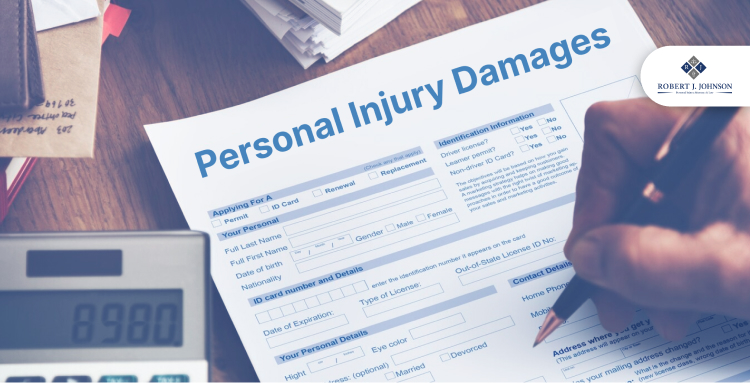
October 20, 2024
How Do You Calculate Damages in a Personal Injury Lawsuit
When you are dealing with a personal injury lawsuit, figuring out the damages you might get can be confusing. According to a recent study, about 4% to 5% actually can go to court. The remaining 95% to 96% may go to trial. The cases that go to trial have more chances of winning.
For instance, the cases of auto accidents have a better rate of success in comparison to the healthcare malpractice cases. Here the success rate of auto accidents is 61% and for healthcare malpractice, it's just about 19%. This report indicates that, if you accept a settlement, you will surely get a certain amount from the insurance company. On the other hand, if you reject the settlement offer, you may get a better outcome or nothing at all.
Many people are struggling to make a better decision about their case and the settlement offer. So, it's important to understand how personal injury damages are calculated. When I was stuck with this matter, I consulted with a lawyer and gathered some useful information on damage calculation. And now I am going to share how you can handle your personal injury cases by calculating the damages correctly.
What exactly does personal injury damage mean?
“Damage” indicates compensation in personal injury cases. Personal injury damage is basically the award that is given to the injured people. The injury causes both financial losses and non-financial impacts on the livelihood of the injured individual. The damage or compensation covers the losses based on their need.

What can you do after an injury?
After an injury, you have to file your claim. Then you have to figure out your compensation or damage. That means you should calculate and estimate how much money you may receive from the insurance provider. So, when is calculating the damage necessary?
When an accident occurs, insurance companies try to create a settlement agreement with the accident victims. After the accident, if you go to court or the insurers try to settle with you, you have to calculate your compensation to receive the money that you deserve. The United States Courts can help you handle the damages in your personal injury cases.
Who is mainly responsible for paying damages?
You already know that insurance providers will pay the compensation after the injury. However, if someone else is responsible for the injury, they should provide you with the expenses. The insurer or the third party who is bound to pay the damages has to pay some extra amounts to reimburse your pain and suffering. Sometimes the insurance company or other responsible group may deny your personal injury claims. You must have a clear understanding of the reasons behind that rejection.

What factors should you evaluate while calculating personal injury damages?
To simplify the process of calculating the damages you should evaluate the following things.
The actual causes of the accident.
The immediate actions that the responsible party has taken to reduce the suffering.
The severity level of the injury.
If an accident occurs in the workplace, the way it affects the working environment and employment in the future.
The intensity of pain, suffering, and mental trauma the injury may cause to the individuals.
The current status of the case, whether it went to trial or already settled out of court.

How can you calculate the personal injury damages in general?
To calculate the damages in a personal injury lawsuit, there is no specific formula used. However, it is calculated by combining the actual expenses and compensation for pain or suffering. You can claim for certain expenses based on your severity of injury and other requirements.
Healthcare expenses: Includes expenses that are used for the purpose of treatment and transportation.
Lost wages: This compensation is given for missed working days because of injury.
Compensation for physical and emotional distress: There is no exact rule to estimate how much you will get paid for your trouble. However, you will get 3 to 5 times more compared to how much you have spent from your pocket.
Property damage: This compensation is given if any kind of damage is found in your property due to this injury.
For instance: James had two issues after the injury. First, he had to pay $200 for medical expenses. Then, due to the missed work, he lost $200 in wages. Because of these two problems, James has decided to claim a total of $1200. The additional $800 is for reducing his suffering and discomfort due to the injury.
On the other hand, William experienced a minor injury that was caused due to the spilling of a soda pop. So, he didn't need to go for a medical check-up. The injury was not major, he didn't sue for any healthcare expenses. He just claimed the price of that soda pop. And that claim was a small amount, in comparison to the amount that James was asking for.
From this example, you will see that James has a lot of things to claim such as medical bills and lost wages. Plus some extra amounts for compensating his pain and suffering. On the other hand, William didn't have any major issues. He just needed to compensate for the minor issues that James experienced.

How can you estimate “general” and “medical” damages?
You can figure out the value needed to minimize the distress from the general damage. Because the injury plays a role in destroying the enjoyment of your life. So, general damage helps compensate for your suffering and discomfort. You can calculate the general damage according to the severity level of the injury and its impact on your life. The amount of general damage also depends on the time needed to recover from the injury. However, as general damage, insurance providers give 1.5 to 5 times more compensation than the medical cost.
On the flip side, medical damages use the costs that cover the overall healthcare support. Costs that are needed for the purpose of doctor visits, medicines, and bills of ambulance are provided as medical damage.
What types of damages are recoverable?
You can recover various types of damages in legal claims.
Expenses of past and future healthcare needs related to the injury.
Compensation for wages you lost due to the injury. Similarly, the compensation you will lose in future earnings as you can not work again.
Certain activities that you were able to do before the injury.
Physical or emotional distress due to the injury.
Physical changes that are visible such as amputations or scars.
What does “special damages” actually mean?
If you lose specific financial activities due to the injury, it indicates special damages.
Managing the repair cost: This includes expenses used to repair or fix any damaged property.
Lost wages: Covers compensation for missing work.
Out-of-pocket expenses: These include expenses for healthcare benefits, such as hospital bills or the cost of medicines and travel expenses for medical appointments. Moreover, it covers the care cost, applicable for family members.
So, how can you calculate the special damages for a personal injury lawsuit?
To calculate the damages, you have to gather certain evidence. This includes bills and receipt of all the expenses related to the special damage. You can also include the approximate future expenses to receive a better outcome.
Note: You have to keep the records or documents of all expenses. This will help you to get a complete package of compensation that you really deserve.
To sum up: Verify that you are fairly compensated
You have to put a lot of effort into evaluating the necessary paperwork before calculating the damage. We have tried to create a list of factors that are important for the calculation. If you find trouble calculating the damage, you can hire a lawyer who can help you figure out the damage correctly.
Lawyers and insurance providers use a set formula to estimate the value of the injury. However, it's crucial to understand the calculation yourself to verify whether you have received fair compensation or not. If you have any queries, drop a comment below. And, if you found this discussion helpful, share it with friends and family who might need it.

































































